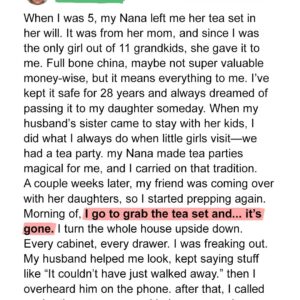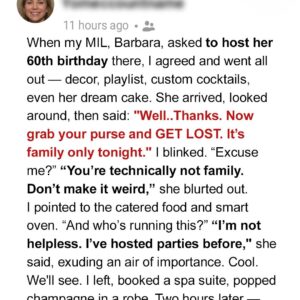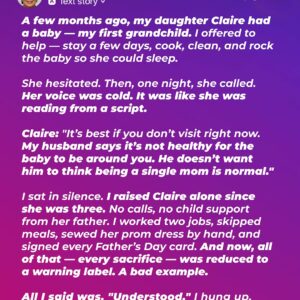My ex’s mother hated me. She invited me to a family holiday dinner. Everyone was staring at me with smirks when I entered. My ex softly suggested I go home, but I thought it was disrespectful.
Then my ex’s mom gave me a lengthy, odd-shaped package. She said, “This is for you, dear,” with a peculiar smile. My skin crawled when I opened it. A toilet brush was inside.
Initially, I assumed I misinterpreted it. Maybe I missed a practical joke. My ex looked away pretending to check his phone and everyone held back their laughter—it was clear. This was planned.
No tears. I kept quiet. I smiled, said “Thank you,” and set the box on the floor. The supper continued like a show.
I became hyper-aware of my chewing, fork holding, and their trap-like questioning.
“Do you clean often?”
If this relationship fails, what are your plans?
You go to community college? That’s nice.”
Cherry on top was dessert. My cookie was on a paper napkin while everyone else had handmade pecan pie with whipped cream.
My ex said nothing on the way home. I eventually spoke up. You know, that was mean.”
Just shrugged. People don’t hate you. Simply testing you.”
A week later, we split. Even if the toilet brush could have been enough, I recognized I was attempting to fit into an environment that never welcomed me.
I relived that supper for months. Not for the gift, but for not defending myself. I embarrassed myself to maintain peace. I remembered that more than the relationship.
Life progressed. I focused on work, recuperating, and rediscovering myself without continual doubt. I even ritualized it.
That box came to mind whenever I felt weak or unsure. It symbolized. Resilience, not shame. I stored it in my closet unopened after that night.
Two years later, something odd happened. I saw my ex at the supermarket. He pushed a baby seat-equipped cart in gym clothes and messy hair. However, no baby.
“Hey,” he said, like old pals.
“Hey,” I said cautiously.
He said he married fast following our breakup. He said his mother loved his wife. He said, “She fits in better,” very casually.
I nodded, pretending not to be annoyed by that last sentence. After an awkward conversation, we parted ways. I thought it was over.
Dana messaged me on Facebook two weeks later. She was unfamiliar. Introducing herself as the new wife. Tagged photographs led her to me.
She apologized for the random message but requested a conversation. She asked queries. I wouldn’t have considered it, but curiosity triumphed. We met at a little cafe on a gloomy Tuesday.
She looked drained. Very exhausted. After fidgeting with her cup, she asked, “Did his mom ever treat you weird?”
I laughed aloud. Just couldn’t.
She appeared relieved. “So I wasn’t alone?”
Dana also had a toilet brush moment. Only hers was worse. She gave a bottle of dish soap with the inscription, “Hope you learn how to be useful.” Dana said her mother-in-law is often critical of her food, attire, and baby holding.
Dana said, “She says things like, ‘If only you were more like her’—referring to you.
Shocked. “Wait. What?”
“Yeah,” she said. “It appears you escaped. She called you courteous, sophisticated, and quiet.”
I nearly choked on coffee. Nice and classy? I accepted a toilet brush present and thanked you.
I sat shocked as Dana continued. Her husband—my ex—was emotionally distant, always working, and treated her like a background figure.
She often wondered if marrying into the family was a mistake. But she was afraid and the baby complicated matters.
Not knowing what to say. How can you comfort someone stuck in a life you left?
She stared at me, tearful. “You left. How did you know? You escaped.”
I thought about that talk for weeks. I wondered how often we mix endurance with love and accept disrespect as “tradition” or “family dynamics.”
I received another surprising communication from my ex’s younger sister soon after. She was sixteen when we dated. Back then, she hardly spoke to me, usually on her phone. She texted inviting me to lunch. Now she was at college.
We met, and she astonished me. She said, “I’ve always wanted to thank you. You grinned at the Christmas dinner that night. You were kind. Despite their bad behavior.”
Unable to speak.
She added, “After you left, I asked my mom why she treated you that way. Because she thinks she’s better than us, she said. It didn’t seem like that. You were rather confident. And they loathed it.”
Something clicked then. The snide remarks, chilly words, and performative malice weren’t about me. This was about control. I was too calm. I’m too confident. It threatened them.
This is where things become weird.
A year later, I organized a local charity event. Volunteering at a women’s shelter led me to organize donation campaigns. One weekend, we were short on volunteers, and one organizer mentioned a family had asked to help.
Guess who entered? My ex’s mother. Including her daughter and Dana.
I stood paralyzed, unsure what to do. They all looked different. Not physically, but softer. Humble.
Mom was first. “I don’t expect you to talk to me,” she said. “But I wanted to help. I’ve got time to think.”
I was silent at first. Just nodded and gave her a clipboard.
We collaborated for several hours. Avoid small conversation. Sorting canned goods, hygiene packs, and garments. It was strange.
Eventually, she pulled me aside. My treatment of you was dreadful. Pushing people down might make me feel better. Upon observing my son’s marriage, I realized I taught him that harshness was normal. I apologize.”
Not sure I believed her. The fact that she said it meant something.
Dana came over later, smiling tiredly. “He filed for divorce,” she whispered. It turned out being a wife and a servant were different.
Hugged her. A long time.
Life doesn’t always provide closure. Sometimes it improves clarity. Clarity is liberating.
The toilet brush? Eventually, I donated. With a note: “Here’s to cleaning out the parts of our lives we never deserved to carry.”
Looking back, I’m not bitter over the supper. Feeling proud. I was proud I didn’t stoop. I left proudly. Learning makes me proud.
Life has a funny way of returning. People alter. They do or not. Your growth strategy matters most.
If you ever find yourself clutching a figurative toilet brush—humiliated, cornered, unsure—remember that others’ treatment doesn’t define you. How you overcome it defines it.
Walking away isn’t always weak. Wisdom.
Becoming someone your critics can’t ignore can be the most satisfying twist.
If this story moved you, share it. They may need a reminder that you are not what they call you. You become what you choose.






